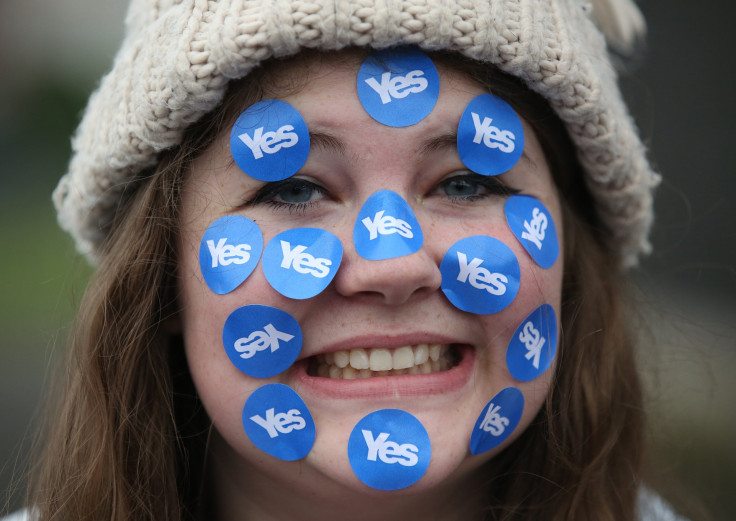What Would An Independent Scotland Look Like?

The move toward making Scotland an independent nation moved one step closer after nationalists started a campaign urging at least 1 million Scots to sign a “declaration” called “Yes Scotland -- in support of independence, ahead of a referendum on the issue in 2014.
We unite behind a declaration of self-evident truth,” Scotland's First Minister, Alex Salmond, told the media at a gathering in Edinburgh.
The people who live in Scotland are best placed to make the decisions that affect Scotland. I want Scotland to be independent not because I think we are better than any other country, but because I know we're as good as any other country. Like these other nations, our future, our resources, our success should be in our own hands.
Salmond added: By the time we enter the referendum campaign in autumn 2014, our intention is to have one million Scots who have signed the independence for Scotland declaration. Friends, if we achieve that, then we shall win an independent Scotland.
Salmond is also leader of the Scottish National Party (SNP), which has long advocated for independence.
SNP has explicitly stated that independence would not mean any kind of rupture from England.
The party assures that independence “will mean a strong, new relationship between Scotland and the rest of the UK. It will create a partnership of equals -- a social union to replace the current political union. That means, on independence day, we'll no longer have a Tory government, but the Queen will be our Head of State, the pound will be our currency and you will still be watching your favorite programs on the BBC. As members of the EU there will be open borders, shared rights, free trade and extensive cooperation.”
A number of prominent Scots, including actors Sean Connery and Alan Cumming, and poet Liz Lochhead, have already signed the “Yes” pledge.
Patrick Harvie, leader of the Scottish Green Party, also appeared at the Edinburgh fest with Salmond, in support of independence.
I certainly look forward to helping develop a clear and compelling case for Scotland to take a bold and radical step and vote 'Yes' to independence in 2014, he said. ”
Greens are not nationalists. In fact, we are probably more comfortable than most parties in acknowledging the range of views that exist in our membership and our voters about the question of independence. But I believe, as most of us do, that the range of powers currently still held at Westminster [London] simply make no sense from a Green perspective.”
Nicola Sturgeon, the Deputy First Minister of Scotland, strongly supports independence as a means of strengthening the Scottish economy.
It's best to have a situation where the big decisions about Scotland, about our future, are taken by the people who care most: the people who live here, she told BBC.
It's not about breakup [of the UK], it's not about separation. We can continue to share things where that makes sense but independence puts powers over our economy, our political life into the hands of the people of Scotland.
Sturgeon also indicated that even if Scotland continued to use the pound sterling as its currency and permit the Bank of England to dictate monetary policy, the country would still be healthy and independent given its North Sea oil wealth and robust whisky exports.
We think [remaining in the sterling] would be good for Scotland in terms of the stability but we also think that there would be an advantage for the rest of the UK, she said.
It's not in any sense a lack of confidence in Scotland's economy. Scotland is more than capable of surviving as an independent country, because it's more than capable of paying its way.
Sturgeon added: The key advantage of independence within a monetary union is the fiscal independence we get. At the moment we have virtually no tax powers in Scotland and therefore we're unable to use fiscal levers to boost the competitiveness of our economy, so fiscal independence within a monetary union [within sterling] is perfectly sensible and advantageous to Scotland.
However, it remains far from certain that the Scottish public even wants independence.
Former chancellor Alistair Darling, now a Scottish Labour MP, cited a recent poll by YouGov, the international market researcher, showing that only one-third of Scots endorse independence.
The real problem that the nationalists have got is that their momentum has stalled and we can see from the poll that only one person in three has actually bought their message,” Darling told BBC.
I believe that people will come to see that we are better and stronger with the UK. I think that there are an awful lot of risks in simply walking away from the UK.
Darling himself is planning to launch a campaign to keep Scotland in the union later this year.
What would an independent Scotland look like and how would it fit in Europe?
According to government records, the entire Scots population is about 5.2 million -- less that the 8-million souls in the city of London alone, and roughly equal to the population of Finland.
Scotland’s two largest cities, Edinburgh and Glasgow, account for just under 1.1 million. Nonetheless, Scotland is more populous than Ireland, an independent state.
Scotland, which has total workforce totals some 2.5 million, had an annual GDP of about £131 billion ($205 billion) in 2010, including oil and gas production, versus $2.25 trillion for the United Kingdom as a whole.
Still, Scotland’s GDP would rank it about the 20th largest in the euro zone, roughly equal to that of Ireland.
Although Scotland has been in union with England formally since 1707 (and informally a century before that when King James VI of Scotland succeeded to the English throne). Scotland has always had a separate legal system from the rest of the kingdom.
© Copyright IBTimes 2024. All rights reserved.











